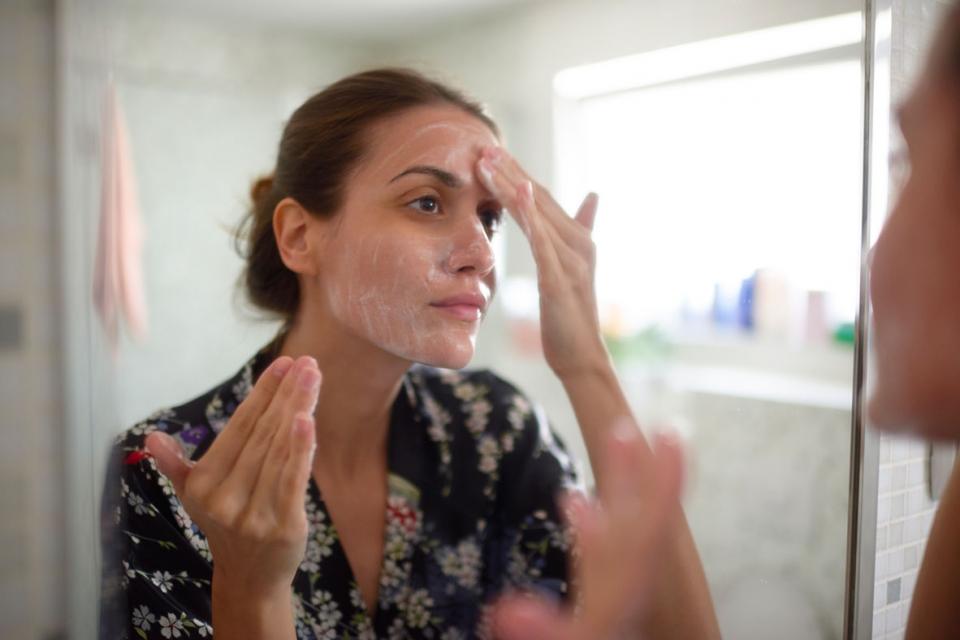Acne is a common concern that many people will experience at some point in life, especially during adolescence.1 Breakouts are often the source of feelings of embarrassment and can affect self-esteem. So, it’s only natural that there’s lots of interest in understanding the factors that may impact acne such as our genetic makeup, hormonal fluctuations, skin care and diet.
In practice
Here’s a brief summary of what we know about diet and acne:
- Contrary to popular belief, scientific studies have not found evidence that eating greasy or high fat foods aggravates acne.
- Eating a diet with a lower glycemic index or glycemic load may help some people reduce acne symptoms.
- Increasing omega-3 fats, from fatty fish for example, may also be beneficial.
- Emerging evidence suggests certain probiotics may be helpful.
- There is currently no robust evidence that dairy foods cause or aggravate acne.
Acne is a very common concern
According to the Canadian Dermatology Association, acne affects as many as 90 percent of teenagers to some degree.1 It also affects about 20 to 30 percent of adults, between the ages of 20 to 40.1 People are more likely to develop acne if one or both of their parents had acne. Thus, heredity appears to play a role in the development of acne.1
How our hormones affect acne
Acne is mostly influenced by our hormones and tends to accompany hormonal fluctuations throughout life.1 That’s why teens are especially prone to acne that occurs with the onset of puberty. In adults, about 75 percent of acne occurs in women.1 Since hormonal fluctuations are usually responsible, some women suffer from acne before their menstrual periods, during pregnancy or menopause.1 Certain medications, especially those that affect hormones such as some contraceptive pills (progestin only) and corticosteroids, may also lead to acne flare ups.1
Skin care matters
Cosmetics and hair products can clog skin pores; so using ‘oil free’, ‘non-comedogenic’ or ‘non-acnegenic’ makeup and products can help.1 While washing with a mild face cleanser twice a day is recommended, it’s best to avoid over-washing or scrubbing with strong cleansers or astringents.1 Excessive sweat and pressure due to tight clothing can also aggravate acne.1
Dietary patterns and foods
The potential role of dietary patterns and specific foods in acne has been debated for decades but little evidence exists to point to any specific food(s). The Canadian Dermatology Association recommends avoiding a food if it seems to aggravate acne.
It has long been thought that eating greasy or high fat foods could aggravate acne, but scientific studies have not found a connection.1 Paying attention to the types of carbohydrate-rich foods consumed and amounts of sugar in the diet appears to be important. Current evidence suggests that eating a diet with a lower glycemic index or glycemic load may help some people reduce acne symptoms.1,2 This generally means eating a diet with less refined carbohydrates, which can help to prevent big spikes in blood sugar levels. Milk and yogurt, including sweetened varieties, have a low glycemic index. Eating more omega-3 fats and fish may also be helpful.2 Emerging research also suggests certain probiotic strains or cultures may help improve acne.2 Fermented dairy foods, such as yogurt and kefir, are convenient dietary sources of probiotics.
When it comes to dairy products and acne, the evidence is currently very limited and of poor quality. While some evidence suggests a link between dairy products and acne symptoms in some people,1 it’s important to note that relatively few studies have been conducted and the ones that have are mainly observational of weaker design (i.e. cross-sectional or retrospective).
More specifically, two recent meta-analyses3,4 of the available observational evidence suggested an association between dairy products and acne; however, the included studies are of weaker design. The authors also point out that the results should be interpreted with caution due to a number of important limitations.3,4 They note that many of the studies were based on self-reported acne diagnosis. Few studies used validated food frequency questionnaires to assess dietary intake which raises concerns about the validity and reliability of the self-reported food intakes and the study results. In addition, most studies did not adjust for potential confounding factors, such as glycemic index, calorie intake and other lifestyle factors associated with acne.
Using more reliable research methodology called “Mendelian randomization”, which more effectively controls for reverse causation and confounding factors, a recent study did not find any link between milk intake and acne in adults.5
More well-designed prospective cohort studies and randomized controlled trials are needed.
There is currently no robust evidence that dairy products cause acne or play a role in acne management.
References
- Canadian Dermatology Association. Acne. Available at: https://dermatology.ca/public-patients/skin/acne/ Accessed November 5, 2020.
- Baldwin H and Tan J. Effects of diet on acne and its response to treatment. Am J Clin Dermatol 2020.
- Juhl CR et al. Dairy intake and acne vulgaris: A systematic review and meta-analysis of 78,529 children, adolescents, and young adults. Nutrients 2018;10:1049.
- Dai R et al. The effect of milk consumption on acne: a meta-analysis of observational studies. JEADV 2018;32:2244–2253.
- Juhl CR et al. Lactase persistence, milk intake, and adult acne: A mendelian randomization study of 20,416 Danish adults. Nutrients 2018;10:1041.


